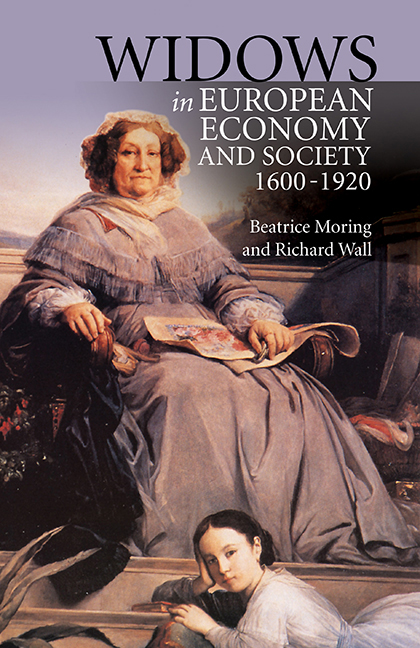Book contents
- Frontmatter
- Contents
- List of Plates
- List of Tables
- Acknowledgements
- Introduction
- 1 Widows and Poverty
- 2 Widows, Legislation and Property
- 3 Assessing the Assets of the Widow
- 4 Life Interest, Usufruct or Pension, The Mainstay of the Widow?
- 5 Urban Widows, Economy and Family
- 6 The Demography of Widowhood
- 7 Household Structure, Age, Social Status and Geography
- Conclusion
- Appendices
4 - Life Interest, Usufruct or Pension, The Mainstay of the Widow?
Published online by Cambridge University Press: 30 August 2017
- Frontmatter
- Contents
- List of Plates
- List of Tables
- Acknowledgements
- Introduction
- 1 Widows and Poverty
- 2 Widows, Legislation and Property
- 3 Assessing the Assets of the Widow
- 4 Life Interest, Usufruct or Pension, The Mainstay of the Widow?
- 5 Urban Widows, Economy and Family
- 6 The Demography of Widowhood
- 7 Household Structure, Age, Social Status and Geography
- Conclusion
- Appendices
Summary
Contractual agreements and female economic security
IN the analysis of property and legislation, we found that the economic balance within families did not always favour women. Both law and custom tended to give priority to males and place decision-making in the hands of fathers. Overall, the process of modernisation only shifted the power from male family members to husbands. Within this crossfire of male interests lay, however, the economic survival of women, when no longer in the hands of male relatives connected by birth or marriage. While contracts stipulating the transfer of economic assets have had a place in European history for centuries, there would seem to have been a link between the increasing property control of husbands, premarital contracts and settlements for widows. The marriage contract was used extensively to safeguard widowhood, but economic security was also achieved in other ways, such as de jure (if not de facto) divisions of property. Property transfer contracts with retirement clauses have sometimes been interpreted as if extracting assets and setting up a new household would be the only true measure of economic authority for a widow. However, studies of living arrangements and the contracts themselves often indicate family interaction.
When examining taxation records and inventories, we were alerted to the fact that these do not reveal the property held by widows for life. Such assets virtually disappeared when the widow died and would, therefore, not be available for scrutiny, as would any pension a widow enjoyed. These provisions are to be found in contracts of various type, primarily marriage contracts, retirement contracts and wills. We intend to demonstrate that the standard of living of a considerable number of women in the past was secured in widowhood through the usufruct of family property.
The retirement contract has often been associated with certain parts of rural central Europe, particularly German-speaking areas, and with the Nordic countries. It is, indeed, true that these areas form the heartland of this custom; but one should, however, remember that similar arrangements can be found elsewhere in Europe, for example in France, Spain and Britain, in marriage contracts or in wills.
- Type
- Chapter
- Information
- Widows in European Economy and Society, 1600-1920 , pp. 119 - 146Publisher: Boydell & BrewerPrint publication year: 2017



